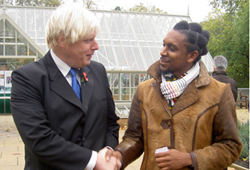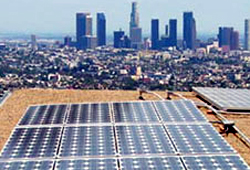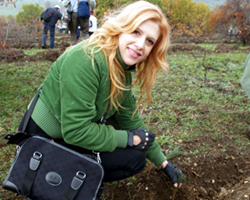Green News Roundup November 2008
Will there ever be sustainable palm oil?
 Since it’s launch in 2004, the Roundtable on Sustainable Palm Oil (RSPO) finally delivered its first sustainable palm oil into Europe, which shipped into Rotterdam last month.
Since it’s launch in 2004, the Roundtable on Sustainable Palm Oil (RSPO) finally delivered its first sustainable palm oil into Europe, which shipped into Rotterdam last month.
Responsible for wide scale tropical deforestation and conflict between local communities, palm oil currently appears in anything from chocolates to cosmetics and is estimated to be in as much as half the products on average supermarket shelves.
Retail giants, such as Unilever and Sainsbury’s, have bought from this first batch. While Sainsbury’s Natural Resources Manager vouched for it’s authenticity, and claimed it to be of ‘a higher standard’ that ‘doesn’t compare with anything we have sourced before,’ Greenpeace were somewhat less convinced.
They said that although the palm oil could potentially be ‘something good’, the current RSPO’s standards and criteria are ‘not strong enough to guarantee that any of the palm oil it certifies is actually sustainable’.
Currently, 80 per cent of global production comes from Indonesian and Malaysian plantations and Greenpeace say it is the leading cause of forest destruction in Indonesia.
Are you still boycotting palm oil products? Do you have any products to recommend that don’t include palm oil? Let us know. Try our range of palm oil free shampoos.
Johnson wants Londoners to ‘grow their own’
The Capital Growth campaign launched last month to help Londoners locate 2,012 green spaces by 2012 to produce more local food. Sites already confirmed include a housing estate in Brixton, a resettlement prison in Richmond and a large privately owned garden where local volunteers will grow and share the harvest.
London has much underused and derelict green space and the project hopes to identify those areas across the capital and match them with enthusiastic gardeners in a time of rising food prices. These spaces could be anywhere from schools, hospitals, housing estates to canal banks, banks of reservoirs and disused railway yards.
Mayor of London Boris Johnson said: ‘Linking up currently unloved patches of land with people who want to discover the wonders of growing their own food, delivers massive benefits. This will aid people to reconnect with where their fruit and veg comes from and cut the congestion and carbon emissions associated with the transportation of food from miles away.’
Critical Mass cycle rallies are ‘not unlawful’
 Those familiar with the Critical Mass bicycle rides in around 400 major cities around the world – where cyclists gather in the last Friday of every month to demonstrate cycling can be a better alternative to cars in cities – will be pleased to know that in the House of Lords last month they were ruled as ‘not unlawful’.
Those familiar with the Critical Mass bicycle rides in around 400 major cities around the world – where cyclists gather in the last Friday of every month to demonstrate cycling can be a better alternative to cars in cities – will be pleased to know that in the House of Lords last month they were ruled as ‘not unlawful’.
Critical Mass were challenging the Metropolitan Police’s action in September 2005 when they handed leaflets to cyclists stating: ‘These cycle protests are not lawful because no organiser has provided police with the necessary notification. Your participation in this event could render you liable to prosecution.’
However, all five Law Lords agreed the rallies to be not unlawful as the monthly rides were ‘commonly or customarily held’ and therefore exempt from the requirements of the Public Order Act 1986.
Friends of the Earth Rights and Justice Centre acted for Critical Mass cyclist Des Kay, hailed the ruling as ‘an important victory for the right to peaceful protest and for cyclists to take part in this monthly celebration of cycling.’
Los Angeles to become world’s biggest solar city
Ambitions are scaling up to address global warming. Los Angeles Mayor Villaraigosa, unveiled a plan last month for sourcing 10 per cent of the city’s energy needs from solar power by 2020.
This ambitious plan requires enough solar panels to produce 1,280 megawatts of power – 500 megawatts from private plants in the desert; 380 megawatts from a programme encouraging residents to install solar panels; while 400 megawatts would come from panels erected on city-owned buildings.
It is expected to cost LA residents approximately two dollars a month once it is completed. ‘L.A. has everything it takes to make this work,’ said Villaraigosa who has launched a series of renewable energy initiatives, and is hoping to achieve a second term as Mayor next March. ‘We have the sun in abundance. And we have the space.’
How a country planted 6 million trees in one day
The Day of the Tree in Macedonia saw hundreds of thousands of citizens take to the hills on a public holiday to reforest a landscape destroyed by two years of forest fires by planting a record-breaking 6 million trees in a single day last month.
Ordinary citizens were transported to some 100 planting sites, where more than 1,000 soldiers joined them (along with national celebrities) to plant the seedlings. The success was put down to the wholehearted support by the government for the NGO, as well as the ‘good cheer’ of the planters.
Initiator of the Day of the Tree project and UNESCO Artist for Peace, opera singer Boris Trajanov, said: ‘If Macedonia, a country of two million people, can plant six million trees, we can only imagine how many trees can be planted in other, bigger countries.’
What do you think about the new sustainable palm oil, Johnson’s greening up of London or the Critical Mass rallies? Let us know and comment below.




